It feels surreal to be sitting out in the New England sunshine, surrounded by majestic trees, overlooking a serene pond, breathing clean air, and just contemplating life. My calves are sweetly aching (translated from the Hindi ‘meetha dard’) from the hiking, kayaking and swimming adventures of the last few days. My mind is beautifully blank, and my body feels light. This must be what it feels like to be blissfully happy and, as Udai put it, “rejuvenated by nature”.
I’ve always been a city girl and have never developed an easy bond with nature. In the nearly 25 years I have lived in the National Capital Territory of Delhi, arguably the world’s most populated and polluted region, interactions with nature have not been a regular part of my life. During the pandemic, I was lucky to explore the Aravali landscapes in my neighbourhood, but those forays, sadly, have not become a habit. Walking around my apartment block and indoor yoga sessions require little additional effort and have thus been routinised, while immersion in nature has taken a backseat. This past week of outdoor life has reminded me this is a mistake.
Nevertheless, that essential fitness routine and the muscle memory of the Aravalli hikes have served me well on this New England trip. On the trails, usually lagging a little behind Rahul and the kids, I found myself falling into a familiar trudging pattern. The same slow and steady rhythm, the sure-footed stomp on hard ground and the more light-footed tread on the slippery and sloping parts. The beautiful numbness and reassuring optimism of moving forward simply by putting one foot in front of the other, again and again.
The trails here are green and lush, covered with pine and oak forests and dotted with adorable little ponds teeming with dragonflies, ducks and fish. Every now and then, we emerged through the forest to find a pristine meadow. On the trails closer to the sea, we walked around wildly beautiful bogs full of birdlife and sandy wetlands where insects and snakes rule. Maps and signages indicate the pride and care local communities lavish on their carefully preserved forest areas.
Some glimpses of the trails we hiked in New England
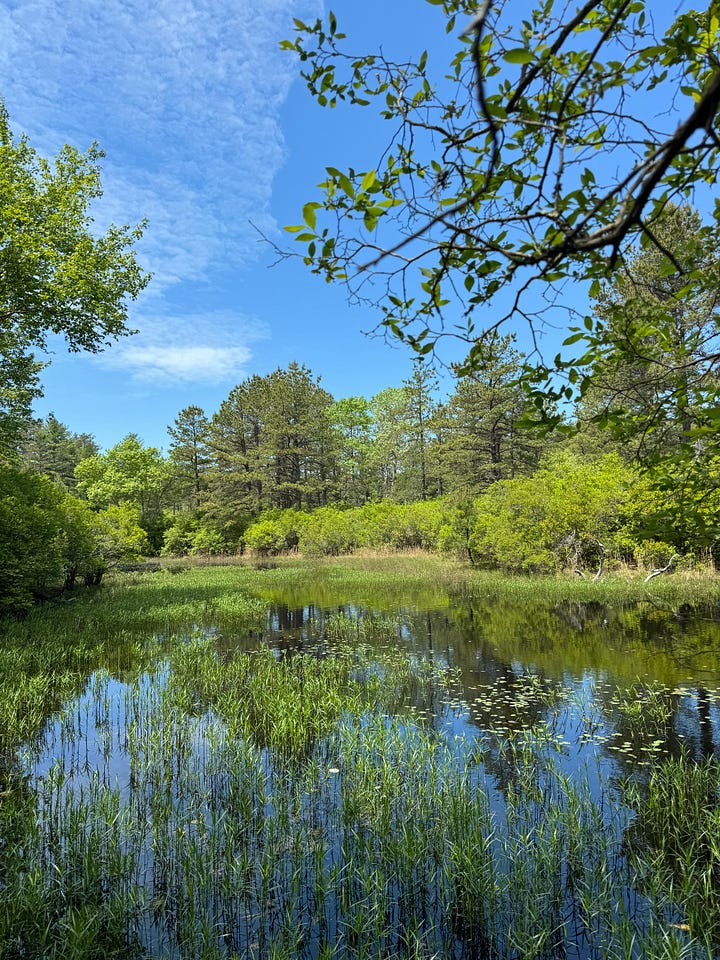
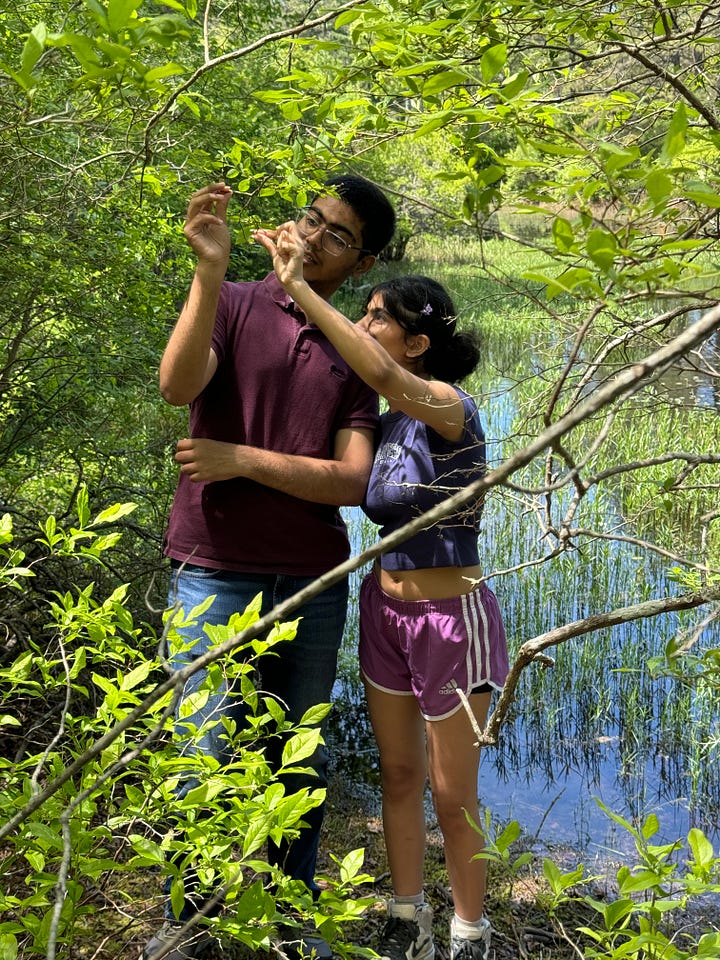
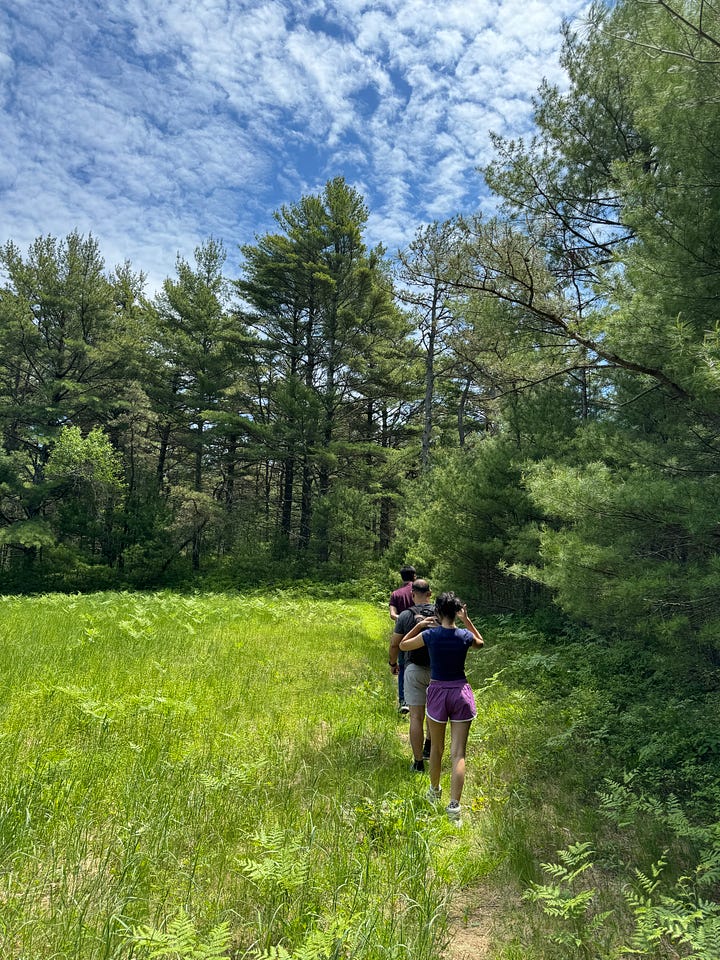
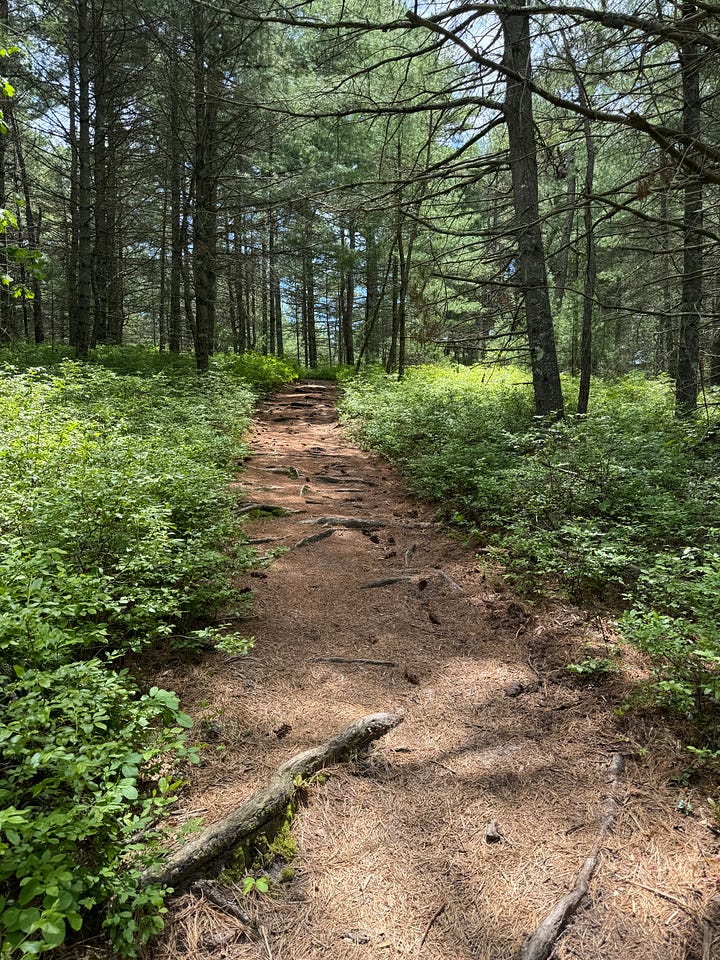
Back home in Gurgaon, the Aravallis present a very different semi-arid landscape with dry, deciduous, low-height forest that covers the land quite sparsely. This part of the world’s oldest mountain range has been ravaged by illegal stone mining and real estate activity and is rapidly desertifying. Still, it is a uniquely beautiful and evocative landscape with dramatic sandstone formations peppered with shiny quartzite and slate. Walking here with friends, I have always felt a sense of connection, responsibility, and a desire to protect and preserve these landscapes from the steady onslaught of capitalistic development.
It heartened me to learn that many areas we hiked in Cape Cod are renewed forests on land that were intensely farmed until a hundred years ago. The colonists also cut down tall trees to build homes and extract salt needed for a booming fishing industry by boiling seawater. And while the big oaks they cut will take centuries to grow back, the creation of the Cape Cod National Seashore in 1963 and a shift to a tourism-based economy has provided both impetus and resources for preservation.
Much like Cape Cod’s colonists expanded farming and fishing in the 18th and 19th centuries, natural landscapes in India are under severe stress from developmental activity, mainly mining and real estate. While heartening conservation efforts like the biodiversity parks in Gurgaon and Delhi try to counter the insistent and powerful push towards real estate development, these are inadequate.
Snapshots from many hikes (2020-2022) in the Aravalis
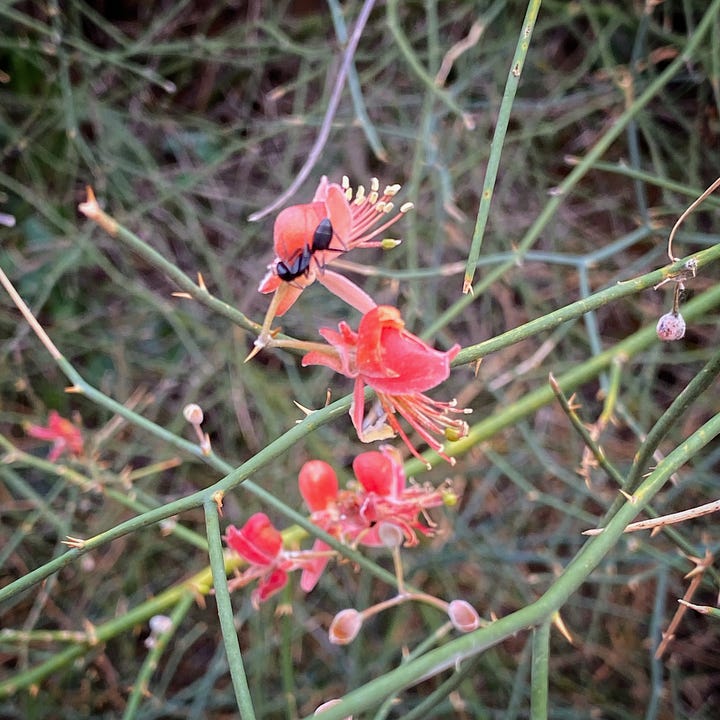
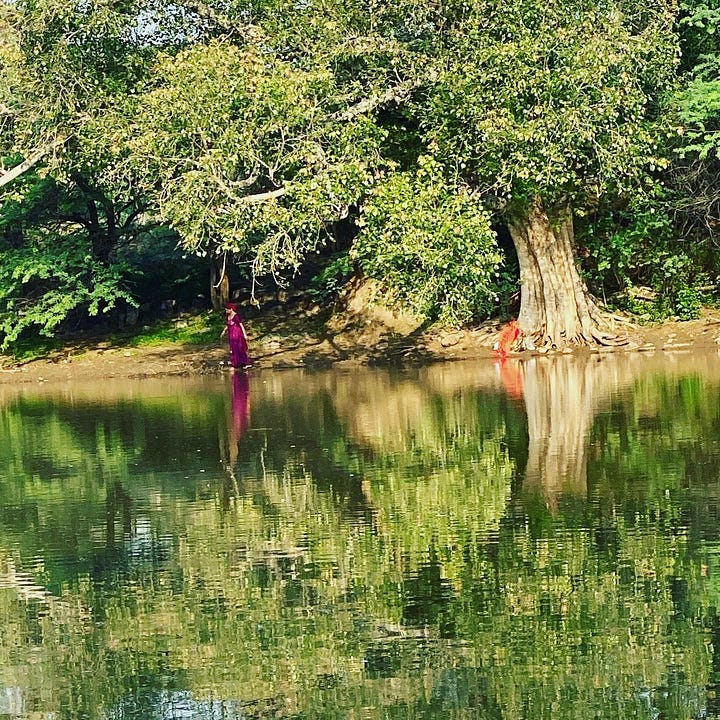
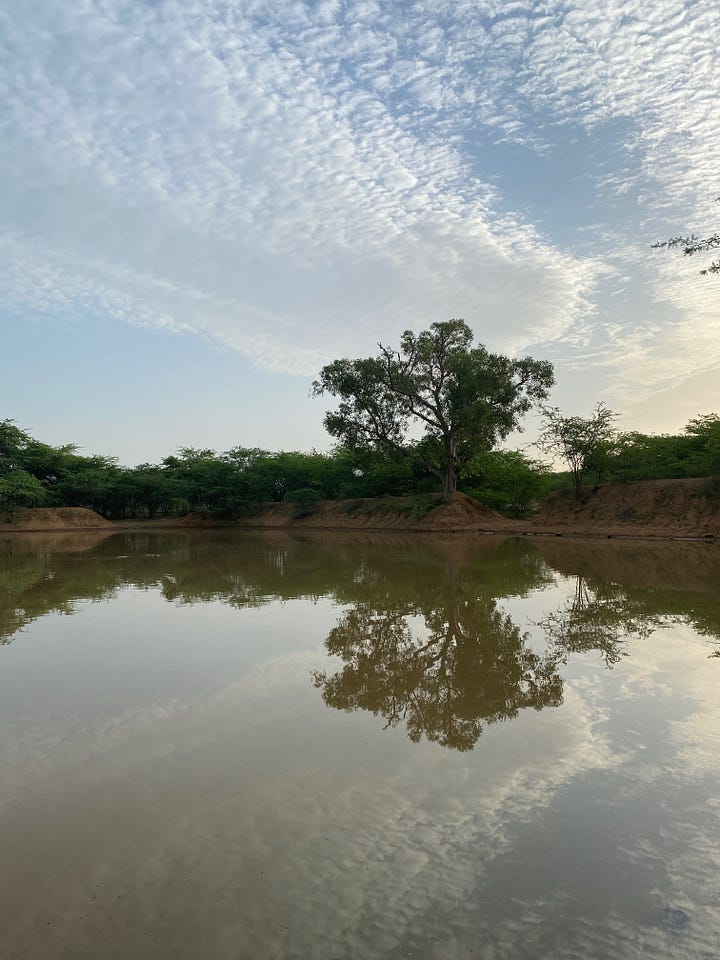
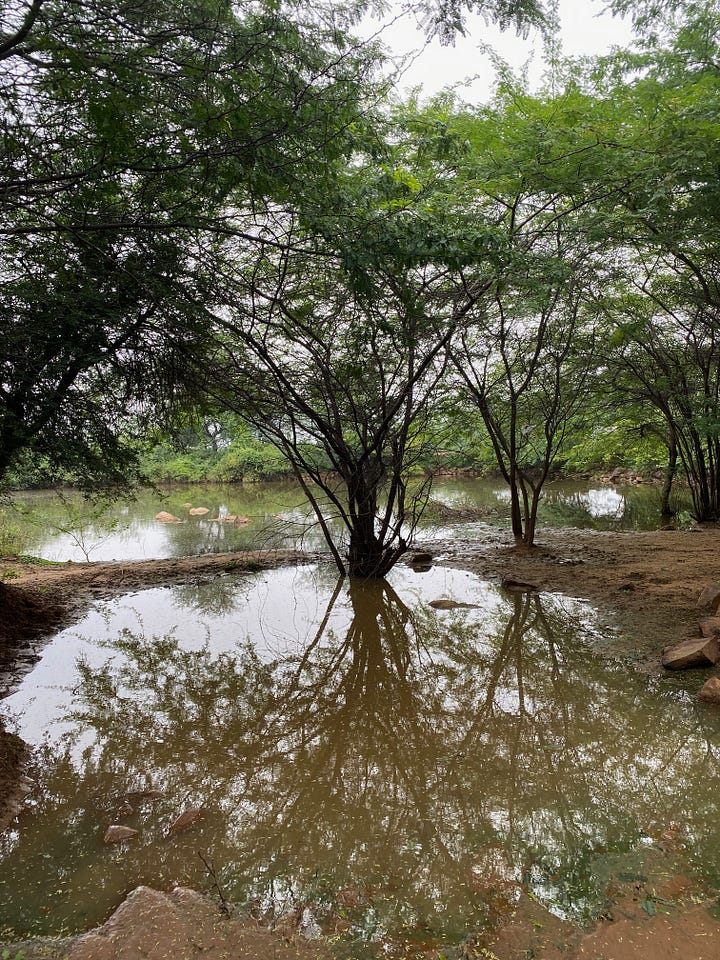
More state efforts towards protection and rejuvenation are urgently needed. Not just for ecological balance, which is a good enough reason if you ask me, but also because conserving natural landscapes improves resilience to climate-related disasters like extreme heat and flooding, both of which the residents of cities like Gurgaon suffer from regularly. Personally, I’m tired of the policy deadlock that pits development against conservation. Clearly, we need both, and we urgently have to find the balance.
Just like in life, we have to balance the productive and goal-oriented aspects with the ones that bring us relaxation. And in that respect, walking in nature reminded me there’s more to a walk than burning calories. Walking around my apartment daily is decent physical exercise, but learning to explore a space that belongs to various other species of flora and fauna offers me a corrected view of my place in the world around me. I see myself not as the centre of my little universe but as a small part of a large ecosystem. Walking around my apartment block, I often think about the chores I need to do or work out a new article in my mind. It takes much longer to disconnect from the pressures of my life. But all my worries take a backseat when I walk amid nature, where I’m immediately immersed in taking in the varied and often unpredictable sensory experiences around me. It’s easier to be in the here and now when the sounds and smells of nature fill my senses, and all I have to do is keep myself moving through beauty.
But I’m a city girl, and my normal day comprises a lot of running around, going to work and getting back home, checking a zillion things down a longish to-do list. Once I’m back in Gurgaon, the hectic routines will take over, and I will forget how good I felt on the forest trails. I will walk around my apartment block every day, trying not to think about the stuff I could not cross off the to-do list, and just as I succeed, it will be time to return home. I will plan many untakeable vacations, dreaming about the mountains and the beach. And when I finally do, I will take another step towards building my relationship with nature. It’s a lifelong pursuit and I’ll take as many shots at it as possible.

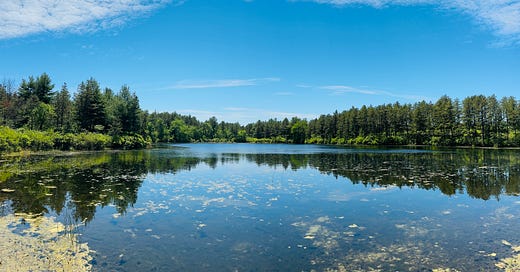









I won’t be able to handle this clean air
Beautifully written Mukta. The real estate companies are literally eating up the green landscapes in and around most cities. Loved reading about your hikes in England.